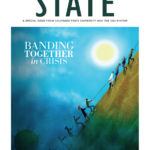Rushika Perera, right, and alumnae researchers Elena Lian and Gabriela Ramirez, in the CSU Department of Microbiology, Immunology, and Pathology, are testing existing drugs, compounds, and chemicals for efficacy in thwarting COVID-19. Photo: William A. Cotton / Colorado State University
During Colorado State University’s sesquicentennial year, we have looked back proudly at our history as our state’s land-grant university. Now, a global pandemic has the whole world looking forward with anxiety and uncertainty, wondering how we will overcome a range of extraordinary challenges.
I can tell you how, precisely because I’ve spent this year learning about CSU’s leadership as a land-grant institution and because I spent 24 years at another land-grant institution before becoming president of CSU.
We will overcome the challenges ahead of us thanks to land-grant universities, which are uniquely prepared to solve the world’s most complex problems, from climate change to a global public health crisis.
Let me give you an example. After CSU was founded in 1870, our professors taught “scientific agriculture” and irrigation to address a local need: how to successfully grow crops in what was then called the Great American Desert. What made that endeavor special back then is the same thing that makes land-grant universities so special today. The university taught students innovative practices backed by research that also was put to use through direct engagement with farmers. And of course, CSU’s innovative farming methods moved quickly beyond Colorado to establish us as a global leader in agriculture.
Those three things – education, research, and engagement – are the pillars of the land-grant
mission. We used them 150 years ago to transform agriculture across an entire region. We use them now to save lives across the world.
As I’ve seen, CSU’s intertwined commitment to teaching, research, and engagement, and the phenomenal breadth of that commitment, makes our land-grant university exactly what the world needs right now.
Amazing work is being done across the university; here are some highlights:
- As early in the pandemic as February, CSU researchers had access in their labs to specimens of the virus that causes COVID-19. That’s because CSU has decades of experience addressing community health needs through infectious disease research and response, in our College of Veterinary Medicine and Biomedical Sciences, in the One Health Institute, and in our Infectious Disease Research Center.
- We have research teams pursuing four vaccine development projects, using an engineered bacterium, a combination of light and vitamin B2, a modified poxvirus used against smallpox, and a tuberculosis vaccine platform.
- Researchers in the Department of Microbiology, Immunology, and Pathology are testing hundreds of existing drugs, compounds, and chemicals to see if they might fight the virus that causes COVID-19.
- At the request of Colorado Gov. Jared Polis, we are coordinating testing among research institutions across the state on shipments of newly manufactured personal protective equipment for the state’s health care workers. As we conduct this testing, we’re also able to provide recommendations for large-scale production and distribution of PPE.
- The Smart Textiles and Nanotechnology Research Group in the College of Health and Human Sciences is testing fabrics for medical gowns, assessing factors such as durability, comfort, safety, and health.
- Engineers and disease researchers with CSU’s Rapid Prototyping and Applied Engineering Lab are moving quickly to develop a disinfectant effective against COVID-19.
- The CSU Veterinary Diagnostic Laboratories have secured certification for laboratory testing performed on humans and are conducting testing for the coronavirus on site.
- We are conducting antibody testing research, with the long-term goal of improving testing for the virus.
We are also thinking holistically and contributing to protect and improve quality of life in the face of COVID-19. Two CSU economists helped shape parts of the initial $2 trillion federal stimulus bill, making sure small agribusinesses weren’t left out. Meanwhile, our social science researchers are investigating the mental health impacts of this pandemic, the impact of sheltering in place on physical activity for older adults, and the long-term economic and sociological impacts that will be felt worldwide.
And let’s not forget CSU’s engagement work. We’re sharing what we discover with our communities and with researchers and partners across the country. We’ve made plans to open residence halls to first responders who need to self-isolate after exposure or for recovery. And at the request of the Colorado commissioner of agriculture, CSU Engagement and Extension convened the CSU Task Force on Colorado Food Supply, which provides up-to-date, data-driven analysis of food supply chain issues created by the pandemic.
Of course, the university has continued to teach many thousands of students, a few of whom have remained in residence halls, most of whom are off-campus and/or with their families. We were thrilled to celebrate the graduation of many just last weekend – with the aid of videos, social media, and other virtual tools. To help students complete the spring semester, our incredible faculty and staff have done much more than teach. Not only did professors completely re-create their syllabi and lessons for the virtual classroom, many of them reached out to students individually, making themselves available at literally all hours of the day, and connecting students to CSU resources they suddenly needed, from financial aid counseling to mental health support. Our academic advisers and student success team members have also personally called, emailed, and texted hundreds of students.
This is the land-grant mission in action in a crisis. It’s an extraordinary thing to be a part of, and for me, as the president of CSU at this historic moment, it has never been clearer that what is truly the foundation of the land-grant university is not the pillars of teaching, research, and engagement.
It’s a commitment to people. And it drives everything we do. It always has.
Today, as when this institution was founded, CSU offers access to higher education. We do essential, purpose-driven research. We affirm that the knowledge we generate must be put to work addressing challenges, solving problems, and improving the quality of people’s lives. And we put people first.
We know that the challenges will continue to get bigger. That’s all right; we will be bolder.
And we will continue to demonstrate the unique and lasting power of the land-grant university to our world, which needs us now more than ever.
Joyce McConnell, J.D., is the first woman and 15th president to lead Colorado State University, flagship of the CSU System and the state’s land-grant university. Founded in 1870, CSU is celebrating its 150th anniversary. Before joining CSU in Summer 2019, McConnell was provost at West Virginia University; she was earlier dean of the WVU College of Law.





